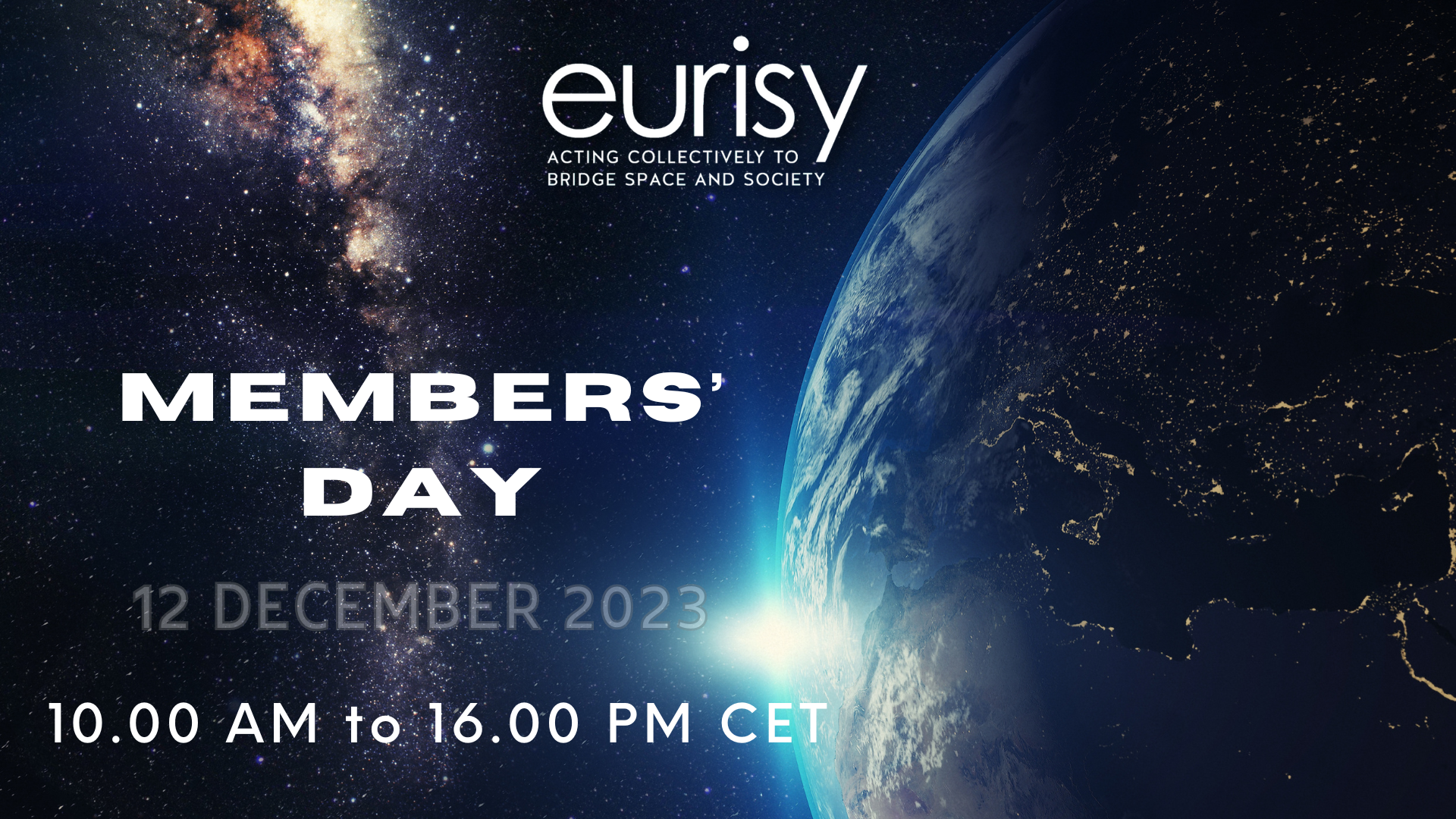It is again that time of the year…eurisy Members’ Day!

Eurisy gathered its members for its yearly event entirely dedicated to its members on 12 December 2023 at the Brussels Institute of Natural Sciences to take stock of all the activities performed throughout the year and to look prospectively at the priorities to be collectively pursued in 2024.
The agenda covered various topics – from the overview of major strategic prerogatives in the space domain of the upcoming Belgian presidency of the Council of the EU to the insights into the ESA space accelerators and ESA Scale up Programme. The participants also discussed the critical shortage of skilled workforce in Europe, that eurisy will actively address in 2024 thanks to the Erasmus+ project SpaceSUITE, the role and activities of the newly established EU Space Support Office (former Copernicus Support Office), the current activities of standartisation related to space downstream segment and how this could support the procurement of spaceborne services. Members were also challenged to brainstorm how to better connect emerging and established space nations revamping the concept of Members’ Corner. The meeting was an occasion for the Eurisy secretariat to present the yearly results of its activities and projects and give a flavour of new initiatives. The Agenda of the day with the link to download all the presentation is available at the end of the article!
The meeting kicked off with the opening address of Mr. Julien Beclard, BELSPO representative, who introduced the audience with the most recent developments in the European space sector and the priorities set by the future presidency of Belgium in the EU. Acknowledging the importance of space activities as a strategic asset, particularly in domains such as security, defense, climate change mitigation, and the empowerment of New Space actors, the Belgium presidency will aim to advance cybersecurity and secure connectivity and to promote the safe, sustainable, and secure use of space. In dealing with these challenges, including also responsible international cooperation, the commitment to nurturing the EU’s open strategic autonomy will run as a common thread. Mr. Beclard outlined that an increasingly congested orbital space raised the necessity of regulation and development of the EU space traffic management approach to contribute to security, sustainability and protection of space. As a result, the EU Council adopted on 8 December conclusions on space traffic management urging on the Commission, the European External Action Service and the European Defence Agency to work with member states to ensure that defence and security aspects are given due consideration, while stressing the civil nature of the EU space programmes.
Ms. Isabelle Duvaux-Béchon, ESA Senior Advisor from the Accelerator Core Team, presented the ESA Accelerators which is a new concept developed by the Agency to boost the use of space based solutions. With the focus on a user-driven approach, there is a need to build a virtuous circle starting from the needs of the users defining the offer and back. To bring this idea to a new level, this concept of accelerating the use of space has been introduced. Resolution adopted by the Ministers at the Space Summit on 6 November 2023 encourages the Space for Green Future Accelerator and supports Rapid and Resilient Crisis Response Accelerator, as well as Protect Accelerator shielding space assets from debris and space weather events. ESA is currently partnering up with relevant stakeholders to each of the three accelerators. Ms. Duvaux-Béchon mentioned the accelerators’ generic development plan for 2023-2026, with the beginning of full operations going beyond 2026. She also touched upon the Civil Security from Space Programme adopted in November 2023 and being the first multidomain programme at ESA.
ESA at the last CM22 presented an overarching strategy to support space companies in their commercialisation endeavours in all the possible aspects. The ESA Scale up Programme was illustrated by Dr. Gianluigi Baldesi, Head of Ventures and Financing Office. He gave an overview of European public investments into space estimated at 14 billion euros (3% growth) in 2022 and 1 billion euros (66% growth) of private investments in European space ventures the same year. With the ScaleUp Innovate ESA is supporting the pre-commercialisation and R&D programmes for aerospace companies, while ScaleUp Invest is supporting the development of ventures in new space markets, enabling aerospace companies with a vision to scale up their operations to become the next big European player on the global space market.
Evolution of the Copernicus Support office into the EU Space Support Office was addressed by Mr. Stéphan Ourevitch who before delving into the novelties highlighted the numbers of users of Copernicus Data Store mounting to 200 000 persons in June 2023, passing beyond the 250 000 marker in September and in November. Copernicus Data Space Ecosystem was reported to be a new data access platform launched in January 2023, easy in use and navigation to retrieve data from Sentinel without any particular expert knowledge. Talking about the Copernicus Expansion mission, Mr. Ourevitch outlined that the re-entry of the United Kingdome in Copernicus has played a role in reinforcing the funding of the Programme and its prospects. He also highlighted that a political agreement on UK participation in Horizon Europe was reached in September 2023 which was an important milestone of the year. Another achievement was the launch of the first four Copernicus thematic Hubs during the EU Space Week in Sevilla with the aim to improve the user experience and streamline access to key information for different stakeholders, policymakers and users by leveraging the open data and information available from different Copernicus core services and providing thematic one-stop-shops. The areas of interest of the HUBs lanched are health, coastal zones, the Arctic, and energy. In addition to this, Copernicus is expanding geographically, with its Data Centers being launched in Panama, the Philippines and Chilly, thus broadening the range of users across the globe. Explaining the transition from Copernicus Support Office to the EU Space Programme Support Office, Mr. Ourevitch emphasized that the change came from the fact that, following EU regulations, all the components of the EU Space Programme are now under one roof with the Commission trying to promote synergies and mutualise some resources. Since 1 September 2023 the new EU Space Programme Office has been addressing the questions coming from users, citizens and media regarding the IRIS 2, GOVSATCOM, Cassini, Space TManagement, etc.
Mr. Miguel Oriz, Deputy Head of GEOLOC Lab, ISO-TC20-SC14-WG8 convenor at Gustave Eiffel University elaborated on the downstream standartisation services. He enumerated several reasons why the downstream standartisation is needed as follows: federation of experts, operators and industries in one domain; development of common international downstream standards to promote the downstream market, enhancement of interoperability and promotion of fair comparison of performances. Ms. Stefka Domuzova, EO Consultant from Climate-KIC elaborated on the PROTECT project – a Horizon Europe project operational for 1,5 year now with the goal to raise awareness and build capacity for the use of pre-commercial procurement in the field of climate services and Earth observation. Pre-commercial procurement is being regarded as one of the many tools that have been emerging over the past years that support the co-creation and co-development of solutions.
Being procurement of EO enabled services one of the biggest challenges currently experienced by public administration the capacity these kinds of projects are building is essential to support a wider uptake of the solutions and services for a multifaced objectives.
Ms. Anna Purkhauser, Senior Consultant at Space.tec partners and project manager at Stars*EU project tackled the issue of the shortage of skills in downstream space value chain in Europe. It was concluded that the space industry does not receive enough qualified applications from graduates, and those applicants who are selected still need training on site. Among the key gaps identified by the research conducted by Stars*EU were fragmentation of skills and education ecosystem, absence of an established accreditation framework, difficulty to attract new talent and limited focus on space for kids, limited activities aimed at fresh graduates and young professionals.
The meeting was concluded by Eurisy President Dominique Tilmans who called upon the participants to discover more about Switch to Space initiative which came about in 2018 as an answer to the lack of young graduates in the space sector. The Switch to Space is seen as a national event that will collect young graduates and students, research centers and space experts under one roof in Brussels. Ms. Tilmans with the support of eurisy has the ambition to internationalise this unique event and to hold similar events in other countries across Europe.
The Members’ Day has also been the stage to present major results from the projects currently populating eurisy’s initiatives. Ms Annalisa Donati emphasised a preliminary overview of the aggregated results of the needs analysis performed in conjunction of the national workshops co-organised with EUSPA on the topic od Disaster Risk Management. To support a deeper awareness of the benefits of satellite solutipons for climate resilience and adaptation a roadmap related to the activities of the project Copernicus Connection was illustrated, the project aims at sharing knowledge and experience among European regions and at promoting the operational uses of Copernicus data and services by local and regional authorities, with a geographic focus on France, Germany, and Switzerland.
2023 marked the end of two major eurisy project e-shape (the flagship EC project Moving away from a data-centric approach to a user-driven era) and GIS4Schools, two others have been kicked off. To delve into the possibilities offered by EO for the monitoring and protection of cultural heritage eurisy joined the consortium led by ICCS for THETIDA.
To address the need to train the trainers, equipping teachers with a set of GEO related skills eurisy also joined the GEO-Academy.
Much more is part of the activities of the association including the members’ corner, the online platform to discuss national activities of our members, our use cases developed to ensure an easy understanding of the benefits of satellite solutions for sector of our society not related to space, we invite all of you to follow our social media to discover what space can offer to all of you!
AGENDA
10:00 – 10:15 Welcome and introduction, Ms Dominique Tilmans, Eurisy President
10:15 – 10:30 BELSPO representative opening address. Overview of major strategic priorities of
the Belgian presidency in the space domain
10:30 – 11:00 Overview of the Eurisy activities during the past year, Ms Annalisa Donati, Eurisy
Secretary General, introduction of new team members
11:00 – 11:30 Isabelle Duvaux-Béchon, ESA Senior Advisor – Accelerator Core Team, Interactive discussion: Outcomes of the European Space Summit. Insights into the ESA Accelerators.
11:45 – 12:15 Dr. Gianluigi Baldesi, ESA Head of Ventures and Financing Office, ESA Scale up Programme: how to boost commercialisation of European space solutions.
12:15 – 12:45 Stéphane Ourevitch, the newly established EU Support Office role and activities to boost users uptake
14:30 – 15:15 Interactive discussion on standardization and PROTECT, the case for pre-commercial procurement
Miguel Oriz, Deputy head of GEOLOC Lab, ISO-TC20-SC14-WG8 convenor, Gustave Eiffel University and Stefka Domuzova, EO Consultant, Climate-KICSkills
15:15 – 16: 00 Ms Anna Purkhauser, Senior Consultant at Space.tec partners, STARS*EU shortage of GEO skills in Europe
Switch to Space Dominique Tilmans, Eurisy president

